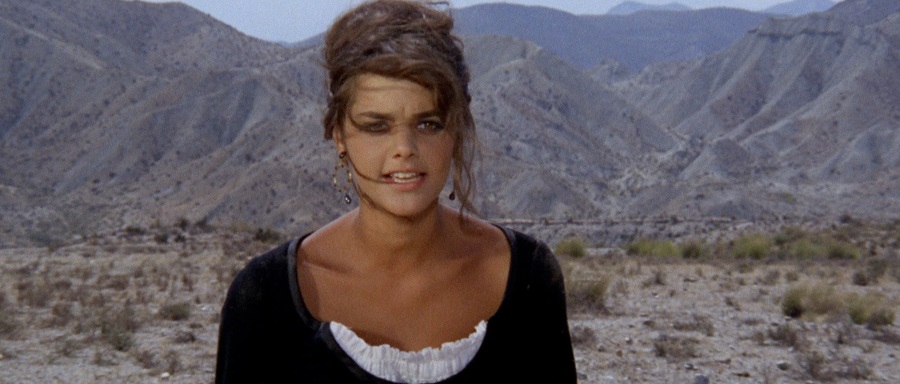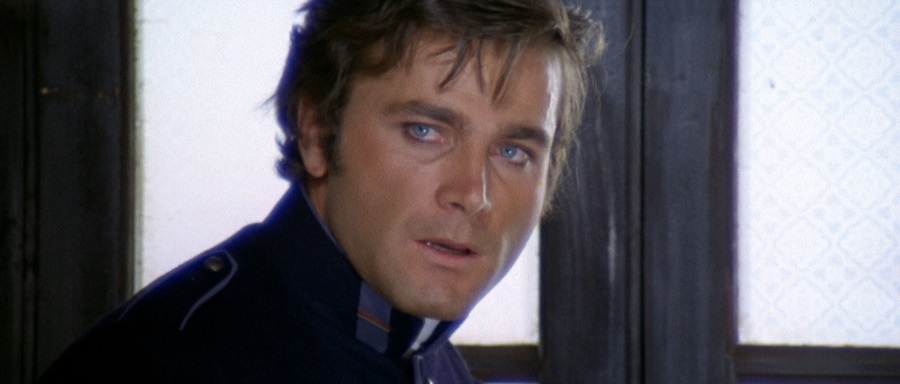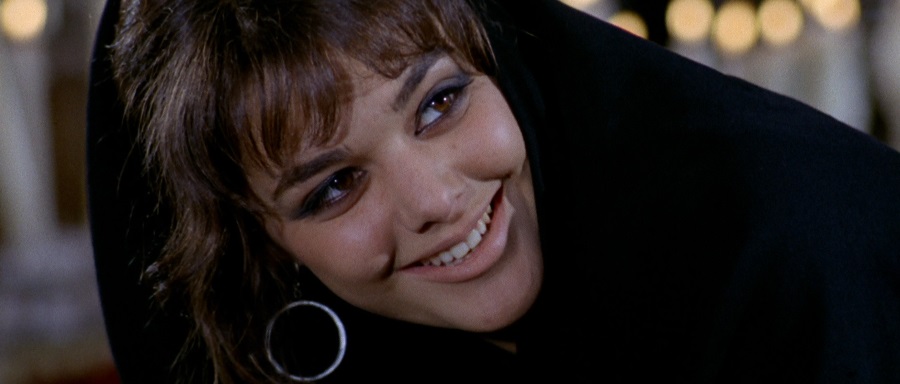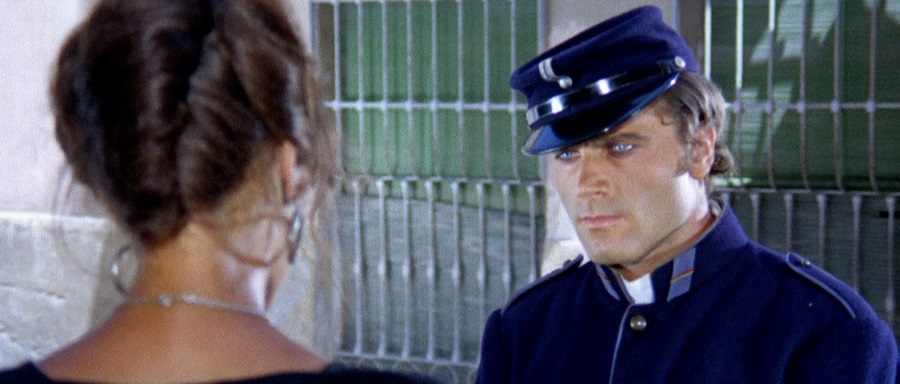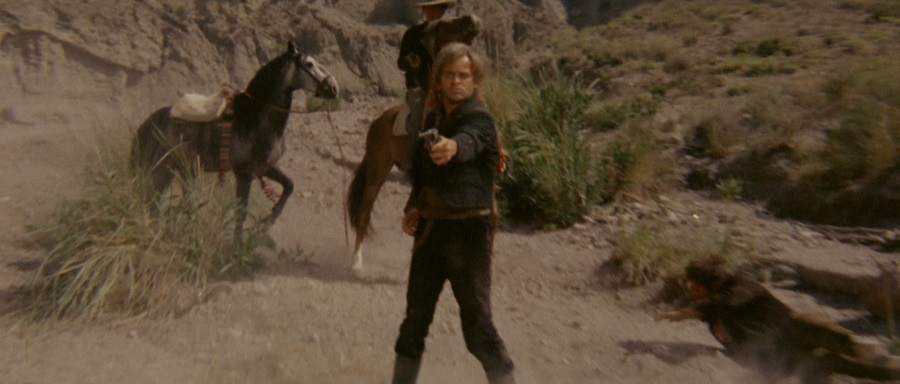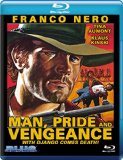| Reviews & Columns |
|
Reviews DVD TV on DVD Blu-ray 4K UHD International DVDs In Theaters Reviews by Studio Video Games Features Collector Series DVDs Easter Egg Database Interviews DVD Talk Radio Feature Articles Columns Anime Talk DVD Savant Horror DVDs The M.O.D. Squad Art House HD Talk Silent DVD
|
DVD Talk Forum |
|
|
| Resources |
|
DVD Price Search Customer Service #'s RCE Info Links |
|
Columns
|
|
|
Man, Pride, and Vengeance
Blue Underground // Unrated // May 26, 2015 // Region 0
List Price: $29.98 [Buy now and save at Amazon]
From Broadway musicals to feature-length figure-skating routines, Carmen has been adapted and reinterpreted in more unrecognizably different forms than any story this side of Shakespeare. In a world where something titled Carmen: A Hip Hopera somehow exists, is a Spaghetti western interpretation really all that outlandish?
Luigi Bazzoni's 1968 film Man, Pride, and Vengeance shatters the traditional Spaghetti western template. Most every last Eurowestern of this era was set against the backdrop of Mexico or the American Southwest; Man, Pride, and Vengeance is set instead in the same Spanish deserts in which it was filmed. The genre is invariably associated with gunplay and a stratospheric body count. Man, Pride, and Vengeance leaves a string of bloodied corpses in its wake as well, but the action is concentrated into a handful of lengthy duels, and even then, the film is far more fascinated by hand-to-hand combat than it is by frenzied shootouts. Nevermind the "vengeance" in the title. Its premise is instead driven by emotional manipulation, infatuation, and all-consuming jealousy. Though none of its characters suddenly break out into song, Man, Pride, and Vengeance ultimately owes more to Bizet than Leone, seizing hold of some of the visual trappings of Spaghetti westerns while remaining disinterested in most everything else associated with the genre.
Django's Franco Nero stars as Don José, a Spanish soldier wholly entranced at the sight of a young gypsy girl (Tina Aumont). When José encounters her again and breaks up a bloodied catfight, Carmen unexpectedly tears off, thanking him for aiding in her escape. That was not at all his intent, but jail time and a demotion inevitably follow regardless. When José is saddled with guard duty, Carmen tries to convince him to let some of her friends sneak inside. The dutiful soldier declines, so Carmen wraps her arms around José for a passionate embrace, allowing the thieves to slink inside the gates just the same. As honorable a man as José convinces himself he is, he's all too willing to sacrifice his rank and reputation if it leads to another night writhing around in the sheets with the woman of his dreams. There's nothing the least bit remarkable about José, though, soon learning that he's not the only puppet whose strings Carmen is pulling. José unleashes his rage not at Carmen but at another man she was fooling around with, and it doesn't end well for either of them. Doggedly hunted for the murder of a superior officer and still very much under the gypsy's spell, José is easily convinced to plan a heist: to in one fell swoop steal enough gold to forge a new life with Carmen far from here. The delusional, disgraced soldier has no idea that this is just Carmen tugging on another of her puppets' strings.
The most problematic aspects of Man, Pride, and Vengeance stem from misplaced expectations. The Django-esque poster art -- hell, even alternate titles explicitly referencing Franco Nero's most iconic role -- bring to mind a profoundly different film than the one Luigi Bazzoni crafted. If you go into Man, Pride, and Vengeance expecting a Spaghetti western, there is a strong likelihood of walking away disappointed. There's very little action or traditional Spaghetti western imagery throughout the first half of the film, which is instead oriented around José being consumed by this relentlessly scheming gypsy girl. The second half -- in which Klaus Kinski's vicious character is introduced and the heist is planned and executed -- scratches more of that Eurowestern itch with its sprawling desert vistas, José's moral descent, and a significantly steeper body count. It's readily argued that, despite its marketing and some visual commonalities, that Man, Pride, and Vengeance should not be classified as a Spaghetti western at all, a stance its deliberate pace and near-total lack of gunplay very much support. Once I finally came to the realization that I was watching a different film than the one I'd anticipated, I found a great deal to appreciate about Man, Pride, and Vengeance. The camerawork and fight choreography are both deeply impressive. The film boasts production values that are considerably higher than average. Klaus Kinski is underutilized, but the cast is otherwise terrific. Franco Nero holds tightly onto my sympathy as José even as he makes one catastrophic decision after another in the name of what he believes to be love. No suspension of disbelief is required that the achingly gorgeous Tina Aumont could so wholly and completely captivate a man. As many times as Carmen has been adapted into film, the storytelling here remains engaging, feeling fresh and vital rather than a rehash of well-trodden territory. Its operatic tragedies sear and sting brilliantly. So long as you're aware that the film is not the traditional Spaghetti western it's presented as, Man, Pride, and Vengeance very much comes Recommended.
Video
As phenomenal as so many of Blue Underground's releases have looked on Blu-ray, the bulk of their Italian titles have been saddled with a very distinctive visual quirk. They boast a texture that at first glance looks close enough to film grain. The difference is that grain is a fundamental part of the image; this analog video noise instead floats above it, disconnected. Because this noise is so fine and so crisply rendered, it lends the image an artificial sense of clarity. When I first experienced this in The Stendhal Syndrome and Django, I wrote rave reviews, but that's because my eyes were so focused on that sheen of analog noise that I mistook for grain. Though it took a few films, my eyes eventually adjusted, looking past the noise to see how soft and lacking in detail the image underneath really was.
This is a very longwinded way of saying that Man, Pride, and Vengeance suffers from these same issues. In all likelihood, anyone reading this review has already picked up at least one Spaghetti western or afflicted Eurohorror release from Blue Underground. If you're a devoted fan of the label's output and have have no idea what it is I'm droning on about, you'll almost certainly think that Man, Pride, and Vengeance looks terrific as well. This presentation does, after all, get quite a lot right. Its colors are very nicely saturated, and the encoding leaves no room for complaint. I spotted some wear in the dead of night duel between José and Garcia, although it's easily overlooked in a sequence so underlit that barely anything is discernable. Otherwise, there's not a fleck of dust or the faintest scratch to get in the way. I'd even argue that the analog video noise is generally less intrusive when stacked next to many of the other afflicted releases. There are scores of moments -- tighter shots, particularly -- that look wonderful despite this noise:
...but then, well:
It really comes down to how intense a reaction you have to this noise. As unwatchable as I've found some of the other afflicted discs to be, the analog video noise didn't have anything close to that ruinous effect throughout Man, Pride, and Vengeance. For my money, it's noticeable throughout the film but is only occasionally distracting. Still, after being spoiled by such exceptional Blu-ray releases as The Big Gundown and Day of Anger, this presentation of Man, Pride, and Vengeance is a disappointment.
Man, Pride, and Vengeance storms onto a dual-layer Blu-ray disc. The film is presented at its theatrical aspect ratio of 2.35:1, although it's slightly windowboxed here
Audio
Two lossless soundtracks have been provided for Man, Pride, and Vengeance, each in 24-bit, monaural DTS-HD Master Audio. This film, the same as most every other European production of its era, was shot without sync sound, so the Italian soundtrack isn't necessarily any more or less valid than the English track. Although the voicework in the English dub is better than average, I personally prefer the Italian performances, despite the actor dubbing Klaus Kinski not sounding nearly as menacing as I would've liked to hear. In terms of fidelity, each soundtrack has its share of pluses and minuses. The Italian track exhibits the most strain, while the English dub is cleaner and brighter but also a good bit thinner. Both are perfectly listenable, though, absolutely meeting my expectations for a Eurowestern -- or something close enough to one, anyway -- of this vintage.
Man, Pride, and Vengeance features two English subtitle streams: one to accompany the English soundtrack and the other a proper translation of the Italian dialogue. French and Spanish subtitles are offered as well.
Extras
The Final Word
Man, Pride, and Vengeance artfully filters Carmen -- one of the most enduring stories of the past two centuries -- through the lens of the Eurowestern. As tremendous as its action sequences are, they're few and far between, as the film is far more interested in exposing the operatic underbelly of romance: infatuation, manipulation, betrayal, and loss. Man, Pride, and Vengeance is a rewarding discovery, but be warned that it rarely resembles the Spaghetti western that its artwork makes it out to be. Recommended.
Luigi Bazzoni's 1968 film Man, Pride, and Vengeance shatters the traditional Spaghetti western template. Most every last Eurowestern of this era was set against the backdrop of Mexico or the American Southwest; Man, Pride, and Vengeance is set instead in the same Spanish deserts in which it was filmed. The genre is invariably associated with gunplay and a stratospheric body count. Man, Pride, and Vengeance leaves a string of bloodied corpses in its wake as well, but the action is concentrated into a handful of lengthy duels, and even then, the film is far more fascinated by hand-to-hand combat than it is by frenzied shootouts. Nevermind the "vengeance" in the title. Its premise is instead driven by emotional manipulation, infatuation, and all-consuming jealousy. Though none of its characters suddenly break out into song, Man, Pride, and Vengeance ultimately owes more to Bizet than Leone, seizing hold of some of the visual trappings of Spaghetti westerns while remaining disinterested in most everything else associated with the genre.
Django's Franco Nero stars as Don José, a Spanish soldier wholly entranced at the sight of a young gypsy girl (Tina Aumont). When José encounters her again and breaks up a bloodied catfight, Carmen unexpectedly tears off, thanking him for aiding in her escape. That was not at all his intent, but jail time and a demotion inevitably follow regardless. When José is saddled with guard duty, Carmen tries to convince him to let some of her friends sneak inside. The dutiful soldier declines, so Carmen wraps her arms around José for a passionate embrace, allowing the thieves to slink inside the gates just the same. As honorable a man as José convinces himself he is, he's all too willing to sacrifice his rank and reputation if it leads to another night writhing around in the sheets with the woman of his dreams. There's nothing the least bit remarkable about José, though, soon learning that he's not the only puppet whose strings Carmen is pulling. José unleashes his rage not at Carmen but at another man she was fooling around with, and it doesn't end well for either of them. Doggedly hunted for the murder of a superior officer and still very much under the gypsy's spell, José is easily convinced to plan a heist: to in one fell swoop steal enough gold to forge a new life with Carmen far from here. The delusional, disgraced soldier has no idea that this is just Carmen tugging on another of her puppets' strings.
The most problematic aspects of Man, Pride, and Vengeance stem from misplaced expectations. The Django-esque poster art -- hell, even alternate titles explicitly referencing Franco Nero's most iconic role -- bring to mind a profoundly different film than the one Luigi Bazzoni crafted. If you go into Man, Pride, and Vengeance expecting a Spaghetti western, there is a strong likelihood of walking away disappointed. There's very little action or traditional Spaghetti western imagery throughout the first half of the film, which is instead oriented around José being consumed by this relentlessly scheming gypsy girl. The second half -- in which Klaus Kinski's vicious character is introduced and the heist is planned and executed -- scratches more of that Eurowestern itch with its sprawling desert vistas, José's moral descent, and a significantly steeper body count. It's readily argued that, despite its marketing and some visual commonalities, that Man, Pride, and Vengeance should not be classified as a Spaghetti western at all, a stance its deliberate pace and near-total lack of gunplay very much support. Once I finally came to the realization that I was watching a different film than the one I'd anticipated, I found a great deal to appreciate about Man, Pride, and Vengeance. The camerawork and fight choreography are both deeply impressive. The film boasts production values that are considerably higher than average. Klaus Kinski is underutilized, but the cast is otherwise terrific. Franco Nero holds tightly onto my sympathy as José even as he makes one catastrophic decision after another in the name of what he believes to be love. No suspension of disbelief is required that the achingly gorgeous Tina Aumont could so wholly and completely captivate a man. As many times as Carmen has been adapted into film, the storytelling here remains engaging, feeling fresh and vital rather than a rehash of well-trodden territory. Its operatic tragedies sear and sting brilliantly. So long as you're aware that the film is not the traditional Spaghetti western it's presented as, Man, Pride, and Vengeance very much comes Recommended.
Video
As phenomenal as so many of Blue Underground's releases have looked on Blu-ray, the bulk of their Italian titles have been saddled with a very distinctive visual quirk. They boast a texture that at first glance looks close enough to film grain. The difference is that grain is a fundamental part of the image; this analog video noise instead floats above it, disconnected. Because this noise is so fine and so crisply rendered, it lends the image an artificial sense of clarity. When I first experienced this in The Stendhal Syndrome and Django, I wrote rave reviews, but that's because my eyes were so focused on that sheen of analog noise that I mistook for grain. Though it took a few films, my eyes eventually adjusted, looking past the noise to see how soft and lacking in detail the image underneath really was.
This is a very longwinded way of saying that Man, Pride, and Vengeance suffers from these same issues. In all likelihood, anyone reading this review has already picked up at least one Spaghetti western or afflicted Eurohorror release from Blue Underground. If you're a devoted fan of the label's output and have have no idea what it is I'm droning on about, you'll almost certainly think that Man, Pride, and Vengeance looks terrific as well. This presentation does, after all, get quite a lot right. Its colors are very nicely saturated, and the encoding leaves no room for complaint. I spotted some wear in the dead of night duel between José and Garcia, although it's easily overlooked in a sequence so underlit that barely anything is discernable. Otherwise, there's not a fleck of dust or the faintest scratch to get in the way. I'd even argue that the analog video noise is generally less intrusive when stacked next to many of the other afflicted releases. There are scores of moments -- tighter shots, particularly -- that look wonderful despite this noise:
...but then, well:
It really comes down to how intense a reaction you have to this noise. As unwatchable as I've found some of the other afflicted discs to be, the analog video noise didn't have anything close to that ruinous effect throughout Man, Pride, and Vengeance. For my money, it's noticeable throughout the film but is only occasionally distracting. Still, after being spoiled by such exceptional Blu-ray releases as The Big Gundown and Day of Anger, this presentation of Man, Pride, and Vengeance is a disappointment.
Man, Pride, and Vengeance storms onto a dual-layer Blu-ray disc. The film is presented at its theatrical aspect ratio of 2.35:1, although it's slightly windowboxed here
Audio
Two lossless soundtracks have been provided for Man, Pride, and Vengeance, each in 24-bit, monaural DTS-HD Master Audio. This film, the same as most every other European production of its era, was shot without sync sound, so the Italian soundtrack isn't necessarily any more or less valid than the English track. Although the voicework in the English dub is better than average, I personally prefer the Italian performances, despite the actor dubbing Klaus Kinski not sounding nearly as menacing as I would've liked to hear. In terms of fidelity, each soundtrack has its share of pluses and minuses. The Italian track exhibits the most strain, while the English dub is cleaner and brighter but also a good bit thinner. Both are perfectly listenable, though, absolutely meeting my expectations for a Eurowestern -- or something close enough to one, anyway -- of this vintage.
Man, Pride, and Vengeance features two English subtitle streams: one to accompany the English soundtrack and the other a proper translation of the Italian dialogue. French and Spanish subtitles are offered as well.
Extras
- Luigi, Vittorio, and Franco (29 min.; HD): Undoubtedly the standout extra on Man, Pride, and Vengeance is this half hour interview with star Franco Nero and camera operator Vittorio Storaro. Nero is very much the dominant presence here and is, as ever, so charming and such an endlessly captivating storyteller that I could listen the man speak for hours. This wasn't just another role for Nero; Man, Pride, and Vengeance offered him the opportunity to work with several longtime friends, and the actor speaks at length about his friendship with the Bazzoni brothers and the soon-to-be-legendary Vittorio Storaro. Scores of wonderful stories are woven along the way, from Nero stripping down to his skivvies for John Huston all the way to Jack Warner agreeing to tear up his multi-picture contract so he'd be free to return home to Italy. Although Storaro does contribute his memories and insight into the production, Nero continually steals the show, lobbing out one brilliant story from filming after another and even explaining why Luigi Bazzoni faded somewhat into obscurity as a director. Absolutely essential viewing.
- Audio Commentary: The commentary track for Man, Pride, and Vengeance is easily overlooked as it's not listed alongside the rest of the extras, but it's worth the additional couple of button presses over to the 'Setup' menu. Spaghetti western scholars C. Courtney Joyner and Henry C. Parke -- who'd previously provided commentary for Compañeros, The Grand Duel, and The Big Gundown -- contribute a tremendous discussion here. Joyner and Parke have forgotten more about Eurowesterns than I'll ever know, and although their familiarity with the genre and this film in particular is beyond encyclopedic, their commentary never once comes across as dry or dull. Their expertise is matched only by their enthusiasm, and Joyner and Parke excitedly tackle most everything you'd hope to hear: the film's clean and almost episodic structure, its editing, the Bazzoni brothers' direction and cinematography, the uncredited score, the course the lead actors' careers took both before and after this film, and what sets Man, Pride, and Vengeance so far apart from the traditional Spaghetti western. A staggering amount of insight and analysis are offered here, and from Django Zhivago to tales of opium being smuggled into Italy inside little Buddha figurines, it's a hell of a lot of fun too.
- Poster and Still Gallery: The still gallery for Man, Pride, and Vengeance has a very low-res look to it -- I wonder if it was compiled with a DVD in mind rather than a Blu-ray disc -- but the selection of material leaves very little room for complaint. With around 42 images in all, this gallery showcases lobby cards, production stills, and poster and video art from all across the globe.
- Trailers (7 min.; HD): Rounding out the extras are an international trailer and an Italian trailer, each clocking in just over three and a half minutes in length.
The Final Word
Man, Pride, and Vengeance artfully filters Carmen -- one of the most enduring stories of the past two centuries -- through the lens of the Eurowestern. As tremendous as its action sequences are, they're few and far between, as the film is far more interested in exposing the operatic underbelly of romance: infatuation, manipulation, betrayal, and loss. Man, Pride, and Vengeance is a rewarding discovery, but be warned that it rarely resembles the Spaghetti western that its artwork makes it out to be. Recommended.
|
| Popular Reviews |
| Sponsored Links |
|
|
| Sponsored Links |
|
|
| Release List | Reviews | Shop | Newsletter | Forum | DVD Giveaways | Blu-Ray | Advertise |
|
Copyright 2024 DVDTalk.com All Rights Reserved. Legal Info, Privacy Policy, Terms of Use,
Manage Preferences,
Your Privacy Choices | |||||||









